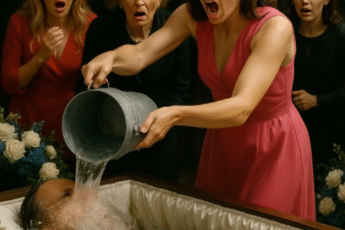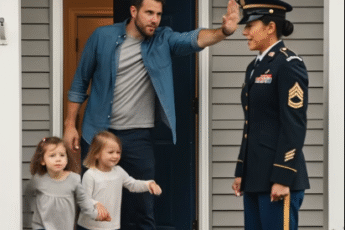I was just a shy intern making copies and fetching coffee when I saw him: an elderly man standing alone in our busy corporate lobby, clearly frustrated as person after person walked past him without a second glance. When I realized he was deaf and trying to communicate, I approached him and signed a simple, “Hello, can I help you?” I had no idea that the CEO of the company was watching from the mezzanine above.
Six months ago, I was the most invisible person at Meridian Communications. At twenty-two, I was a junior marketing intern who spent her days making photocopies, organizing supply closets, and trying to blend into the background of one of Chicago’s most prestigious advertising agencies. I was the kind of person who ate lunch alone at her desk and took the stairs instead of the elevator to avoid small talk. The internship was supposed to be my fresh start, but it had become another place where I felt small and insignificant.
The only thing that gave my life real meaning was my little brother, Danny. He was eight years old and had been born deaf. While our parents struggled to learn sign language, I had thrown myself into it with a passion that surprised everyone. Danny became my motivation to master something that mattered. By the time I started at Meridian, I was fluent in American Sign Language. It was the one skill I was truly proud of, though it had never seemed relevant. In the corporate world, my ability to communicate with the deaf community felt like a beautiful but useless talent, like being able to play the violin in a world that only valued electric guitars.
The morning that changed everything started like any other. It was a Tuesday in October, and the Meridian building was buzzing with its usual frenetic energy. We were preparing for a major client presentation, and everyone was stressed and rushed. I was stationed at the reception area, helping organize materials, when I noticed him. He was an elderly man, probably in his seventies, impeccably dressed in a navy-blue suit that looked expensive and well-tailored. But there was something in his eyes—a mixture of frustration and sadness—that made my heart ache.
He was standing at the reception desk, trying to communicate with Jessica, our head receptionist. Jessica was a perfectly nice person, but she was busy and growing impatient.
“Sir, I’m sorry, but I don’t understand what you’re trying to tell me. Do you have an appointment? Can you write down who you’re here to see?”
The man was gesturing, pointing toward the elevators, his mouth moving silently. And then I saw it: the subtle hand movements, the facial expressions, the way he was trying to finger-spell something. He was signing.
I watched in growing dismay as Jessica turned to help another visitor, effectively dismissing him. He stood there for a moment, looking lost. Account executives in expensive suits and creative directors with their arms full of presentation boards rushed past. Not one of them stopped.
My first instinct was to stay where I was. I was just an intern. My supervisor, Margaret, had made it clear my job was to support the presentation prep. But as I watched the man’s shoulders slump, I thought about Danny. I thought about how it felt when people looked through him as if his deafness made him invisible. In that moment, I made a choice.
I walked over to the reception desk, my heart pounding with nervousness. The man looked up as I approached, his eyes weary with the expectation of another dismissal. I took a deep breath and signed, “Hello, my name is Catherine. Can I help you?”
The transformation in his face was immediate and profound. His eyes widened with surprise and relief, and a smile spread across his features. “You sign,” he responded, his hands moving with the fluid grace of someone who had used ASL for decades. “Thank goodness. I was beginning to think no one here could understand me.”
“I’m so sorry you’ve been having trouble,” I signed back. “What can I help you with?”
“I’m here to see my son,” he explained, “but I don’t have an appointment. And the young woman at the desk seemed very busy.”
“What’s your son’s name?” I asked.
The man paused, a mixture of pride and uncertainty on his face. “Michael Hartwell,” he signed finally.
My heart nearly stopped. Michael Hartwell, the CEO of Meridian Communications, the man whose corner office occupied the entire top floor, whose rare appearances caused a ripple of nervous energy among the staff.
“Mr. Hartwell is your son?” I signed, trying to keep my jaw from dropping.
“Yes,” he confirmed. “I know he’s very busy, but I was in the neighborhood and thought perhaps I could see him for just a few minutes.”
I could see the vulnerability in his expression. This was a father who wanted to see his son, but he didn’t feel entirely welcome in his own son’s workplace. “Of course,” I signed. “Let me see what I can do. Would you like to have a seat while I make some calls?”
I guided him to a comfortable chair, then faced my first major challenge: how does a lowly intern arrange a meeting with the CEO? I started with his executive assistant, a formidable woman named Patricia who guarded his schedule like a dragon protecting treasure.
“Mr. Hartwell’s office. This is Patricia.”
“Hi, Patricia. This is Katherine Walsh from the intern program. I have a visitor here in the lobby who says he’s Mr. Hartwell’s father and would like to see him.”
There was a long pause. “His… father?”
“Yes, ma’am. An elderly gentleman. He’s been waiting in the lobby.”
Another pause, longer this time. “I’ll need to check with Mr. Hartwell. Have the visitor wait.”
I hung up and returned to Mr. Hartwell—Robert, as he’d introduced himself. While we waited, we signed, and I discovered that Robert Hartwell was one of the most interesting people I’d ever met. He told me about his career as an architect, how he’d designed several of the buildings that now made up the Chicago skyline. He told me about his late wife, Michael’s mother, who had been a teacher at the Illinois School for the Deaf.
“He’s always been driven,” Robert signed, his expression a mixture of admiration and concern. “Even as a child, he wanted to prove himself, to show the world that having a deaf father didn’t hold him back. I’m proud of what he’s accomplished, but sometimes I worry that he’s forgotten how to slow down.”
Twenty minutes passed, then thirty. Patricia called back to say that Mr. Hartwell was in back-to-back meetings and wouldn’t be available for at least another hour. I could see the disappointment in Robert’s eyes.
“Perhaps I should come back another time,” he signed. “I don’t want to be a bother.”
“You’re not a bother,” I assured him. “Would you like to wait? I can show you around the building if you’d like. We have some beautiful artwork on the upper floors.”
His face lit up. “I would love that. I haven’t seen where Michael works.”
And so began what would later be described as the most unauthorized building tour in Meridian Communications history. Instead of making copies, I spent the next two hours giving Robert Hartwell a tour of his son’s company. We started in the creative department, where I translated conversations and watched his face light up with pride as he learned about the company his son had built.
Throughout the tour, I was acutely aware that I was neglecting my duties. My phone buzzed with increasingly urgent texts from Margaret, asking where I was. But every time I looked at Robert’s face, saw the joy and interest in his eyes, I couldn’t bring myself to cut the tour short.
It was during our visit to the marketing analytics department that I first noticed him. Michael Hartwell was standing on the mezzanine level that overlooked the main floor, partially hidden behind a pillar. He was watching us—watching his father interact with his employees, watching me translate. I couldn’t see his expression clearly, but something about his posture suggested he’d been there for a while. My heart started racing. I’m probably about to be fired. But when I glanced back a few seconds later, he was gone.
We finally ended on the executive floor. “Michael built all of this,” Robert signed, looking around the elegant suite.
“He did,” I confirmed. “Everyone here has a lot of respect for him.”
Robert nodded, but I could see something wistful in his expression. “I’m proud of him,” he signed. “I just wish… I wish I knew him better as an adult. When he was young, we were very close. But as he got older, he seemed to feel like he needed to take care of everything himself. I think he thought my deafness made me fragile, that he needed to protect me from his worries.”
My heart ached for both of them. It was nearly three o’clock when we returned to the lobby. As Robert prepared to leave, I saw Margaret approaching, her face a mask of barely controlled anger.
“Catherine,” she said, her voice sharp enough to cut glass. “I need to speak with you. Now.”
I turned to Robert to explain, but before I could sign anything, a voice behind me said, “Actually, Margaret, I need to speak with Miss Walsh first.”
I turned and found myself face to face with Michael Hartwell himself. He was tall, with the same intelligent eyes as his father and an air of quiet authority.
“Mr. Hartwell,” Margaret stammered, clearly stunned. “I was just about to discuss Ms. Walsh’s absence from her assigned duties…”
“She was supposed to be helping my father,” Michael said quietly, his eyes never leaving my face, “which, from what I observed, she did beautifully.”
The lobby seemed to go quiet. Margaret’s mouth opened and closed without a sound.
“Dad,” Michael said, and for the first time, I heard his voice soften. He turned to his father and began to sign—slowly, somewhat clumsily, but with obvious effort and care. “I’m sorry I kept you waiting. I didn’t know you were here until…” he paused, glancing at me, then continued, “…until I saw you with Catherine. I’ve been watching you two for the past hour. I haven’t seen you look that happy in years.”
Robert’s face was radiant with joy and surprise. “You’ve been learning to sign?”
“I’ve been trying,” Michael admitted, his hands moving more confidently. “I should have done it years ago. I should have made more effort to communicate with you in your language instead of always expecting you to adapt to mine.”
Father and son embraced then, right there in the middle of the lobby, and I felt tears spring to my eyes. When they separated, Michael turned back to me. “Miss Walsh, could I speak with you in my office?”
My heart pounded as I followed Michael and Robert to the executive elevator. Michael’s office had a breathtaking view of the Chicago skyline, but what struck me most was how impersonal it felt.
“Please, sit,” Michael said, taking the chair next to his father rather than the one behind his desk. “Miss Walsh,” he began, “I owe you an apology.”
I looked at him in confusion. “Sir, I’m the one who should be apologizing. I know I was supposed to be—”
He held up a hand. “You did exactly what you should have done. What I wish more of my employees would do.” He looked at his father with an expression of profound regret. “My father has visited this office three times in the ten years since I became CEO. Each time, he’s been treated like an inconvenience. Each time, I’ve watched from a distance as my own employees made him feel unwelcome.”
His voice grew thick with emotion. “Today was different. Today, I watched a twenty-two-year-old intern abandon her duties to spend three hours making my father feel valued, respected, and included. I watched her give him something I haven’t given him in years: the feeling that he belongs in my world.”
“Mr. Hartwell,” I stammered, “I just… I have a younger brother who’s deaf. I know how it feels when people treat him like he’s invisible. I couldn’t stand to see that happen to your father.”
“And that,” he said, “is exactly why I need to talk to you about your future here.”
My heart sank. This was it, the gentle letdown. “I understand if you need to let me go,” I said quietly.
Michael looked genuinely surprised. “Let you go? Miss Walsh, I want to offer you a job. A real job, not an internship.”
I stared at him, certain I’d misheard. “I’m sorry, what?”
“What I witnessed today showed me something that’s been missing from this company: a genuine commitment to inclusion. We talk about it, but we don’t live it. I want to change that, and I want you to help me. I’m creating a new position: Director of Accessibility and Inclusion. You’d report directly to me.”
I felt dizzy. “Mr. Hartwell, I’m just an intern. I don’t have any experience…”
“You have something more valuable than experience,” he said firmly. “You have empathy. You have the ability to see people as individuals rather than inconveniences. And you have a skill set that could transform how this company operates.”
I looked at Robert, who was practically vibrating with excitement, then back to Michael. “I… I don’t know what to say.”
“Say you’ll think about it,” Michael suggested. “But I hope you’ll say yes. This company needs someone like you. I need someone like you.”
The rest of the meeting was a blur. By the time I left, my entire life had been turned upside down. Robert hugged me goodbye. “You’ve given me my son back,” he signed.
On Monday morning, I accepted the job. Over the next six months, I implemented sweeping changes. We installed visual alert systems, brought in ASL interpreters for all company meetings, created accessibility guidelines, and instituted mandatory inclusion training for all employees, starting with the executive team. Margaret, my former supervisor, was one of my most enthusiastic students.
The most meaningful change was cultural. The company that had once focused solely on productivity began to value empathy as a core business principle. Six months after that life-changing Tuesday, Meridian Communications won a national award for workplace inclusion. Michael asked me to accept it.
“This recognition belongs to a wise man who taught me that the most important business skill isn’t knowing how to close a deal,” I said in my acceptance speech, “it’s knowing how to see the humanity in every person you encounter.”
In the audience, Robert was beaming with pride, signing his applause. Next to him, Michael was smiling, their relationship transformed. The shy intern who once felt invisible had found her voice by helping others find theirs. My brother Danny was right; I had become a kind of superhero, not the cape-wearing kind, but the kind that fights for a world where everyone belongs. And it all started with a simple hello, signed to a lonely man in a busy lobby.




